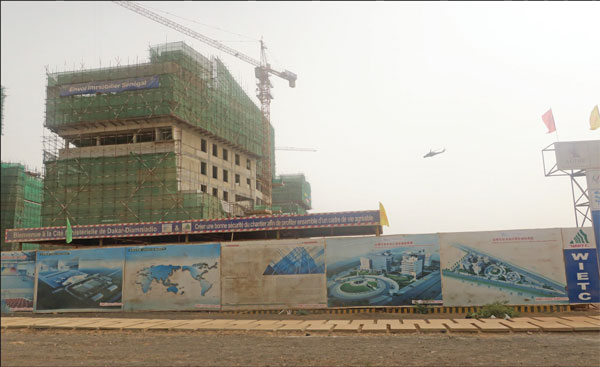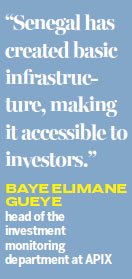Growth designs
Trade between China and Senegal has boomed over the last decade. In 2005, it reached $2.32 billion, according to the government, competing strongly with other traditional development partners. China is among the top five foreign investors in Senegal and ranks first among Asian countries. It has invested in infrastructure expansion, with the biggest road project - the Ila Touba Highway, which costs $812 million and links Dakar to Touba - financed by China. Senegal's government wants to redirect China's investment into its fledgling industrial sector.
"We know they are coming, as they pursue strategies to shed some low-end manufacturing," says Aly Ngouille Ndiaye, Senegal's minister of mines and industry.
|
THE DAKAR INTEGRATED SPECIAL ECONOMIC ZONE will host state ministries, universities, research centers, hospitality and sporting facilities and the new Diamniadio city. Lucy Morangi / China Daily |
The West African country is well positioned to benefit from an export-oriented sector. It is only four hours away from Europe and its Atlantic port, backed by a relatively stable government, makes it quite attractive to Chinese investors, who have previously invested in traditional industries such as mining and infrastructure. However, it ranks 147 out of 190 countries on the World Bank's ease of doing business index due to challenges with electricity supply and bureaucracy.
Senegal is, however, determined to bag Chinese businesses in a brutally competitive landscape that has East African countries such as Kenya, Tanzania and Rwanda - together with East Asian countries such as Vietnam - vying for the same opportunities.
"We are already working with Chinese firms in developing the first phase of the industrial park ... (and) we look forward to enhancing our current collaboration and have forwarded a proposal for them to finance the second phase. We are waiting for their feedback," says Ndiaye.
If China agrees to enter into the partnership, the minister says it will not only unlock the potential of this West African country but will also generate much-needed jobs for the growing youth population.
"With industries we have jobs and that is what this government is working toward," says the minister, adding that there is much to look forward to in this collaboration, such as technology transfer and capacity building. "We are also looking forward to collaborating with them in the agri-processing sector."
This will not be difficult. Last year, Senegal, the seventh-largest peanut exporter in the world, saw its farmers' income increase because of Chinese demand. Although China itself is a major producer, it imports Senegalese peanuts to make oil to meet the growing demand of a health-conscious population. With production set to increase, the government is working toward making the West African nation an emerging economy by 2020.
"Senegal has created basic infrastructure, such as roads and power, making it accessible to investors," says Baye Elimane Gueye, head of the investment monitoring department at APIX, an investment promotion and major projects agency in Dakar.
A one-stop shop has been founded to ease the processes of registering and setting up businesses in the country.























